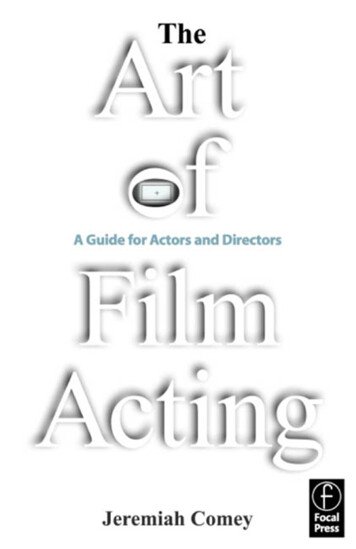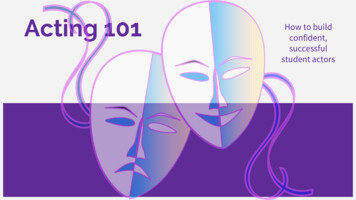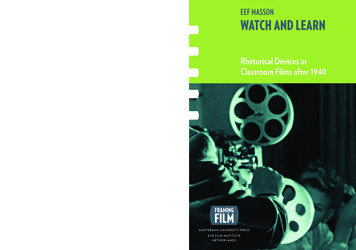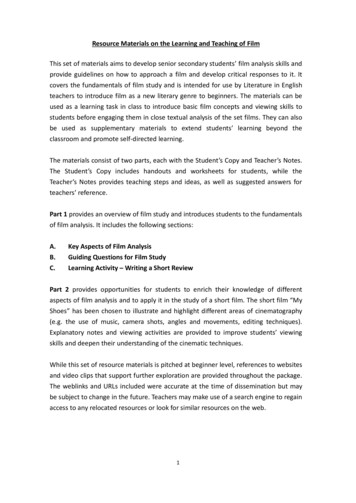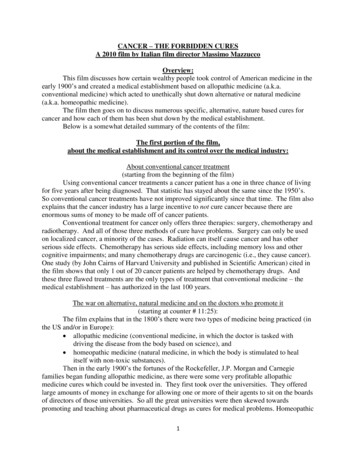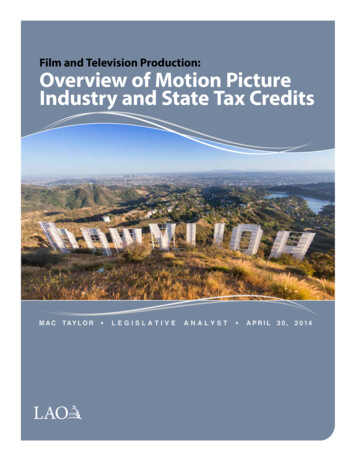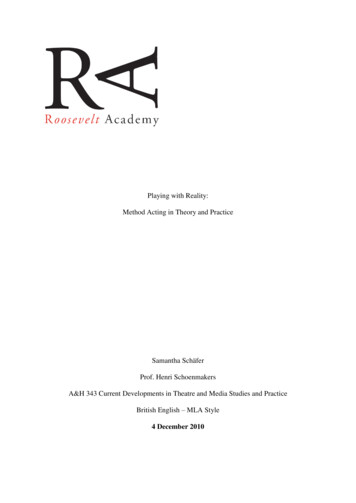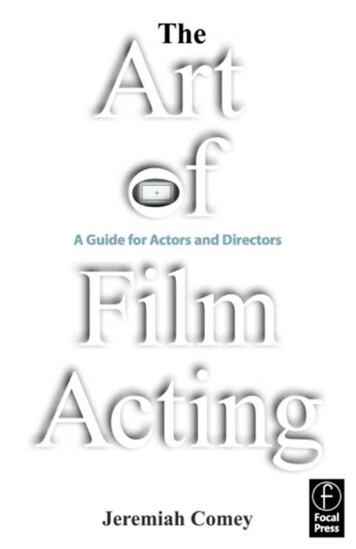
Transcription
The Art of Film Acting
This Page Intentionally Left Blank
The Art of FilmActing: A Guide forActors and DirectorsJeremiah Comey
Focal Press is an imprint of Elsevier Science.Copyright 2002 by Elsevier Science (USA)All rights reserved.No part of this publication may be reproduced, stored in a retrieval system, or transmittedin any form or by any means, electronic, mechanical, photocopying, recording, or otherwise,without the prior written permission of the publisher.Recognizing the importance of preserving what has been written, Elsevier Science prints itsbooks on acid-free paper whenever possible.Library of Congress Cataloging-in-Publication DataComey, Jeremiah.The art of film acting : a guide for actors and directors / Jeremiah Comey.p. cm.Includes bibliographical references and index.ISBN 0-240-80507-0 (pbk. : alk. paper)1. Motion picture acting. I. Title.PN1995.9A26 C65 2002791.43'028--dc212001058628British Library Cataloguing-in-Publication DataA catalogue record for this book is available from the British Library.The publisher offers special discounts on bulk orders of this book.For information, please contact:Manager of Special SalesElsevier Science225 Wildwood AvenueWoburn, MA 01801-2041Tel: 781-904-2500Fax: 781-904-2620For information on all Focal Press publications available, contact our World Wide Web homepage at: www.focalpress.com10 9 8 7 6 5 4 3 2 1Printed in the United States of America
To my wife, Janet, who taught me what love reallymeans, and my daughters, Jessica and Megan, who haveallowed me to experience a second childhood.
This Page Intentionally Left Blank
ContentsPrefacexiAcknowledgments1. The Exercisexiii1Transcript of two actors doing a scene in class. Jeremiahinteracts with them and guides them through the sceneusing the Five Arts 1. Summary 9. Actor Practice 9.2. Stage versus Film Acting10Preparing for a Role 11. The Demands of Performance 12.One Good Performance 13. Projecting 13. Film andTheater Close-Ups 14. Emotions and Feelings 14.Subtext 15. Camera and Proscenium Arch 18.Personality and Character 19. Dialogue 22.Monologues 22. Film Experience versus Stage Experience24. Reacting 25. Summary 26. Actor Practice 27.3. Becoming a Great Actor28The Actor’s Responsibility 28. Casablanca 28. Acting IsBeing and Awareness 29. The Five Arts of Film Acting30. The Power of Relating 36. Acting “On the Nose” 37.Listen to the Other Actor 37. Acting Is a Profession 38.Summary 38. Actor Practice 38.4. Sight Reading42How Sight Reading Works 42. How to Sight Read 43.Importance of Sight Reading 45. Second-Guessing thevii
viiiCONTENTSDirector 45. Multiple Auditions 46. Helpful Hints 46.Summary 46. Actor Practice 47.5. The Art of Concentration48Concentration 48. Internal Rap 48. Interest Is the FocalPoint of Concentration 49. Feedback 50. Emotions 50.Happiness, Sadness, Anger, Fear, Love 52. Differentiatingbetween the Emotions 59. Laughter and Sadness 60.Focused Concentration 63. How to Increase YourConcentration 63. Summary 66. Actor Practice 67.6. The Art of Not Knowing68Everything Happens As If for the First Time 68. BeingIntimate without Taking It Personally 74. Beginner’sMind and Logical Mind 74. After the Scene, Forget It 74.Opinions and Beliefs Will Destroy You 75. Play theCharacter, Not the Stereotype 75. Judgment Is a Trap 78.Leave Your Feelings on the Set 78. Self-Criticism 79.Use Your Beginner’s Mind to Not Know 80. Summary80. Actor Practice 80.7. More on the Art of Not Knowing81The First Time 81. Bad Acting on Film Is the Triumphof Logic 88. Don’t Be Safe 89. The Power of NotKnowing 92. Memorizing and Not Knowing 93.Repeating an Emotional Experience 94. Discover Facts byConcentrating on the Other Actor 94. Judgments RuinYour Acting 97. A Genuine Experience 97. Summary 98.Actor Practice 99.8. Still More on the Art of Not Knowing100The Director’s Ideas 100. Ideas and the Actors 101.The Director’s Vision 101. Good Actors MakeThings Happen 106. Directors Use Blocking to ElicitResponses 110. A Director’s Scene Preparation 111.Importance of the Art of Not Knowing 114.Summary 115. Actor Practice 115.9. The Art of Acceptance117Acceptance 117. Play the Game 120. Trust the RollerCoaster 124. Having Fun 125. Sets and Locations AreReal 128. Summary 128. Actor Practice 129.
Contents10. The Art of Giving and Receivingix131Giving and Receiving 131. Giving, Receiving, andSubtext 137. Accepting Responsibility 138. The RelatingExercise 141. Different Emotional Levels 141. There AreNo Officially Sanctioned Responses 146. Summary 147.Actor Practice 147.11. The Senses148See through Untainted Eyes 148. The Abilities 151. TheMaestro’s Ears 153. The Sense of Touch 158. Touchingto Relax 158. Touching to Stimulate Love 160. Touchingto Provoke Anger 160. Touching to StimulateLaughter 163. Smell and Taste 164. Summary 164.Actor Practice 165.12. Intimacy, Empathy, and Intuition167You Are What You Are: The First Ingredient ofIntimacy 167. Intimacy: The Quality of Good Actors168. Memory and Fear: The Enemies of Intimacy 168.Empathy 171. Intimacy and Empathy 172. Scenes “NotWorthy” of an Actor 174. Physical Actions 176.Intuition: Your Sixth Sense 177. The Creative InnerChild 179. Words That Prevent Good Acting 183. Act,Don’t Think 185. Summary 185. Actor Practice 186.13. The Audition187Getting Ready to Audition 187. Casting for Type.188.Film and Stage Casting 189. Auditioning 190. FilmAudition 191. Acting in Plays 192. Approaches to Acting192. Physical and Emotional Aspects of Characterization195. Imagination 202. Subtext 202. Types of Actors 205.The Message You Send 206. Summary 207. ActorPractice 207.14. More on the Audition209The Casting Director 209. The Job 210. Acting Is aBusiness 210. Why Actors Don’t Get Cast 213. TheDifferences between the Relating Exercise and theAudition 215. The Art of Not Knowing 216. The“Where.” 218. Sides 219. Fear 219. Relaxing 220.Benefit of the Relating Exercise in Audition 220. Skillsfor the Audition 220. Preparation for Audition 225.
xCONTENTSThe Audition 226. Commercial Improvisation 228.Comedic Improvisation 229. Dramatic Improvisation229. Summary 230. Actor Practice 231.15. The Comedy Audition233Comedy and Exposition 233. Characterization 238.Absurd Situations 239. Environment 241. ComedyPatterns 241. Auditioning for Comedy 242. Find theHumor 243. The Elements of Comedy 243. ComicActors 254. Physical Comedy or Farce 255. Punchingand Undercutting 257. Rhythm, Tempo, and Pacing 258.Rehearsal 260. Emotional Ideas 261. Preparing for theComedy Audition 265. In the Audition 265.Summary 266. Actor Practice 267.16. Conclusion268How It Happens 268. Summary 272.Afterword273How to Get in Touch with Jeremiah 275.Bibliography276Videography278Index282
PrefaceFilm acting, like all art, is a form of communication, a relationship with another human being on an emotional level. Vincent van Gogh’s artis an inspiration because he put the most meaningful of ingredients into hispaintings—himself. Just as great artists define themselves by their art, so dobrilliant film actors communicate through their quality, which is personalitycombined with talent.Acting is probably the most competitive business in the world because, forone thing, everyone thinks they can act. If you want to paint, sculpt, or compose music, everyone accepts the necessity for talent and training. No one intheir right mind would think of being a professional concert pianist withouthaving started practice at age four or five. But almost everyone thinks acting iseasy. It is not; but we all can act if we first get out of our own way and forget allthe social and personal inhibitions that have been laid upon us by our parents,our peers, and society. If you want to be a film actor, don’t let anyone discourage you from your dream; but don’t assume that it is quick and easy.Acting is an art, and like the other arts, it demands that you study and master the craft. You also need to be able to expose your true feelings. It is easy tocry when you fight with a lover or watch a tearjerker. But it is another matterto cry in an audition or in a scene. In front of the camera, it can be a nightmarefor an untrained actor simply to be believable and emotionally honest in a sceneas simple as a quiet talk over a cup of coffee. In your everyday life it’s hard toforget your inhibitions and, like a child, be your natural self. To become a goodactor, you have to let the world see your emotions. Sir Laurence Olivier, one ofthe greatest actors, said, “This is not an occupation for adults.”Yet it is possible for a fifty-year-old woman who is inhibited to come intomy class with no previous training and within weeks be giving a good film performance. She will have relapses and will have to keep working hard, butthrough the “Relating Exercise” she is learning how to override her intellectand show her emotions. It’s not easy to take off your emotional clothing andxi
xiiPREFACEshow your real self, but this is what has to happen when you are in a film closeup. Experiences, family, friends, and everyone we have ever met have made apersonal and permanent impact on our inner lives. The performances of greatactors give us insight into these personal relationships and feelings by letting ussee and experience their emotional impact.This book explains how to make the transition to film acting from bothstage acting and everyday life, and how to handle yourself in a professional situation. Reading this book alone will not make you a great actor; but it’s a goodplace to start. Persistent application of its principles can guide you to the confidence and the skill you need to show your talent.When you read this book, take your time. Borrow, rent, or buy all the filmsI use for examples. Study them and the performances I have talked about. Dothe exercises in the book. When you work in other classes or workshops, try theprinciples of the Arts of Concentration, Acceptance, Not Knowing, Giving andReceiving, to help you in the Art of Relating. Relating is your way to attainemotional power. Every time you relate, you release a depth charge thatexplodes and shakes emotions loose from your inhibitions. Then your creativesubconscious—the source of all great art—will force both these and unexpectedemotions to the surface. You will find this process both a revelation and aninspiration, and so will everyone who watches you work.
AcknowledgmentsI am happy to acknowledge help from Howard Gong, who gave meongoing counsel and the will to begin this book and see it through. I owe thanksto Barbara Bowen for allowing me to use her scenes for workshop material; toSamantha Lane, who helped me put my thoughts in order; to Christine Mehnerfor her wide knowledge and support; to my friends and fellow teachers MarkBrandon, Dan Chernau, and Robert Winley, who graciously read the first draftsand helped me find direction; to Allan and Alicia Sirkin and Barbara De Primafor sponsoring my workshop in Miami; to Adam Stoner, who invited me toteach at the New York Film Academy; to Carol Hemingway, Jack Angel,DeeDee Michales, Robert Marcucci, Bob Brisco, and Robert Mckee for theirsupport; to Helene Wong and Vicky Yiannoutsos, who were instrumental inbringing me to New Zealand as a Fulbright grantee to work with writers, directors, and actors.I want to thank the professors and teachers who encouraged me to finishthe book: Joy Rinaldi; Doug McHugh; Dunja Tot; Lynbarbra Mahler; ClayBanks; Nya Daigoa, a gifted artist who designed the cover; and my dear friendPatch MacKenzie, who supported my teaching from the beginning. I am grateful to every student I have had the pleasure to teach, for they have helped melearn.I’ve had the privilege of studying with some remarkable acting teacherswho helped me in my own personal journey—Rudi Solari, Guy Stockwell, StellaAdler, Sherman Marx, Cory Allen, and my first mentor, Charles Conrad, whogenerously started me on my way as a teacher. I especially want to thank WillAdams, a special friend and mentor, for without his expertise and help this bookcould never have been written. But my deepest debt is to Jan, my wife. Her lovehas sustained me throughout.xiii
This Page Intentionally Left Blank
1The ExerciseJack Nicholson, in Five Easy Pieces, single-handedly ushered in a new styleof acting, a brand-new spontaneity that seemed to indicate he was performing without a script.Shirley MacLaineMy aim is to get you to relate to another actor as a real humanbeing—woman to man, boy to girl, mother to daughter, man to man—and notas a person saying words from a script according to some logical idea as to howthey should be said. I’m going to show you how I conduct my film-acting“Relating Exercise” to teach actors how to relate and how to concentrate. Iteach more than the Exercise, but in it you learn the essential skill that sets youon your way to learning all the other skills that are fundamental to your becoming a great actor.Here is a Relating Exercise scene as it was done in my class. A CaliforniaHighway Patrol Officer, Chip, has stopped a beautiful woman, Mary, for speeding and is writing her a ticket. Mary, though a beginning actor, has no troublerelating to Chip. She is open, finds him attractive, and flirts with him. But theactor playing Chip, although he has been on a few auditions, has a problem: he’s“in his head,” which means that he intellectualizes the role and is acting withthe idea that he’s a cop, because the script and his logic have told him he’s acop. So he “acts” how he thinks a cop should act, which, of course, preventshim from relating honestly to Mary. As a result, he is pretty dull and uninteresting. I work with him to get him “out of his head” and to respond to whatMary is doing. When he finally does get out of his head, both he and the scenebecome interesting.The two beginning actors face each other. Earlier, I had asked each to readthe scene once silently, without making any judgments. (As in all scenes in thisbook, the directions in parentheses are descriptions of what the actors actuallydid.)1
2THE EXERCISECHIP(formal and official)May I please see your licenseand registration?MARYNo.CHIPExcuse me?MARYI left in a hurry and forgotmy purse.(flirting)And it looks like I’m going tomiss my hair appointment.(Chip is unresponsive to the fact that he is talking to abeautiful woman who is flirting with him.)CHIPCan I see your registration?I interrupt the scene.JEREMIAH: What is she feeling?CHIP(to Jeremiah)She’s angry because she isgetting a ticket.(She is definitely not angry.)JEREMIAH: That’s an idea you’ve got in your head. Look at her eyes and forgetabout being a cop. What is she feeling?(Mary is smiling, seductive.)CHIP(to Jeremiah)She doesn’t like me.JEREMIAH: Are you kidding? Look at her face. Is she happy, sad, angry, afraid,or loving?
The Exercise3CHIP(to Jeremiah)She is afraid.JEREMIAH: Where do you see any fear?(Mary is still smiling and very appealing.)CHIP(to Jeremiah)Well, she’s getting a ticket.JEREMIAH: I’m not talking about what the script says. Look at her eyes. Whatmakes you think she’s afraid?CHIPNothing.JEREMIAH: All right. Look at her mouth. Is she happy?CHIPShe’s smiling.JEREMIAH: Then is she happy? Is she loving? By loving I mean is she warm,caring, flirting, or anything that can be classified as loving?CHIPYeah.JEREMIAH: Then deal with that. The script says she’s angry, but she’s not.That’s all you have to deal with. Look at her eyes.CHIPShe seems to be coming on tome.JEREMIAH: You see it! Great! Then is she happy and loving?CHIPYes.JEREMIAH: Then deal with those feelings when you say your lines.(Chip is now concentrating his attention on Mary’s emotions.She is flirting.)
4THE EXERCISECHIP(laughs, responding to herflirting)Is this your name? Mrs. MaryBrenco?MARYIt’s Miss, not Mrs.(smiling)I hate that feminist stuffabout women’s liberation.There’s only one place where awoman should be liberated.(She laughs suggestively.)(Chip gives her a coplike disapproving look. He goes back toacting the way he thinks a cop ought to act.)JEREMIAH: What is she feeling?CHIPShe’s loving.JEREMIAH: Are you dealing with that emotion?CHIP(to Jeremiah)No. I’m maintaining my coolbecause a cop would never getinvolved. It would be out ofcharacter.JEREMIAH: Forget about how you think a cop should react. Deal with the emotion she is giving you. A movie scene is between people, not between robots.(Chip has trouble relating to Mary because the idea of beinga cop still gets in his way.)I ask Mary to stroke his face to break his paralyzing concept of being a cop.Touching stimulates intimacy, the exact opposite of Chip’s idea. As we shallsee, touching evokes the Art of Giving and Receiving.(Mary repeats the lines as she strokes his face.)
The Exercise5MARYYes it is. But it’s Miss, notMrs.(lovingly)I hate that feminist stuffabout women’s liberation.There’s only one place a womanshould be liberated.(Chip gets turned on by her touching his face, and he reactslovingly.)I interrupt the scene and play back this part of the tape for the class. We seethat he reacts to Mary instead of trying to act an idea.JEREMIAH: That works much better. (to the class) See how much more interesting they both are?(Return to scene)CHIP(smiling, because she isstroking his face)Miss, you were doing 95 in a65. I’m putting it down atseventy-five.MARY(laughing)I didn’t know I was that fast.(Now he’s getting into it.)CHIP(laughing)I’m also putting you down fordriving without a license.MARY(laughing)You’re not going to take meinto custody?(Flirting, she kisses him.)
6THE EXERCISECHIP(ignoring the kiss)You don’t look like a desperate criminal to me.JEREMIAH: What did she just do?CHIP(to Jeremiah)She kissed me.JEREMIAH: Why aren’t you responding to her kiss?(Chip is back in his cop mode.)CHIP(to Jeremiah)I don’t think a cop would beturned on to someone he’s giving a ticket to. That would beout of character.JEREMIAH: Acting is about having an experience—so stop thinking and justrespond to her. You don’t have to grab her and throw her down on the seat. Butyou do have to react inside to what she is doing and feeling. The audience wantsto see you feel something. Forget thinking that what you do is right or wrong.The experience you have inside you is more interesting than any of your ideas.Now, deal with her kiss.(Return to scene)(She kisses him again.)MARYDid anyone ever tell you youwere handsome?CHIP(He blushes, embarrassed—fear.)No, Ma’am.Now he stops “acting” like a cop and deals with Mary as a woman. As aresult, he experiences some real feelings.(Mary strokes Chip’s face and kisses him. Then, in a softertone)
The Exercise7MARYI am desperate. Why don’t yougive me your phone number?CHIP(He responds, kissing her.)I’m on duty.MARY(intimately)When do you get off duty?(Chip is now relating to Mary and continues to relate to theend of the scene. As he relates to her, he and the scenebecome interesting.)CHIP(smiling, softly)Late tonight.MARY(smiling)Do you know Victoria’s Secret?CHIP(lovingly)Is it a nightclub?(Mary, turned on, responds lovingly.)MARYNo silly, it’s lingerie, andI’d like your opinion on something. See you tonight. Hereis my number. Got to run. Byebye.END OF THE SCENECHIP(to Jeremiah)But this would never work in acasting office.JEREMIAH: Don’t underestimate casting directors.
8THE EXERCISECHIP(to Jeremiah)They’re not going to cast meif I come on to this womanwhen I’m supposed to be a cop.JEREMIAH: Casting directors, and particularly film directors, know when theysee an honest response. That’s what they’re looking for.CHIP(to Jeremiah)But, what if there’s no actorto relate to, like in a casting session when the castingdirector doesn’t read with anyemotion or anything?JEREMIAH: Listen to the dialogue! Accept the imaginary situation. The combination of acceptance and real listening, along with the actual experience ofreading in an office, will stimulate your creative process. If an unplanned spontaneous experience happens, go with it. If your response is honest it will work.Which did you enjoy the most? When you were playing the cop, or when youwere relating?CHIP(to Jeremiah)When I was relating.JEREMIAH: And that’s when you were fascinating to watch.In this kind of a situation it is easy to fall into the trap of playing the stereotype. If the role is a cop, an inexperienced or insensitive actor will play thescene like Chip did at the beginning, acting according to some intellectual concept of what a cop should be. If the role, say, is a priest, your intellect temptsyou to speak in a clever Irish brogue. Mediocre actors always play the stereotype instead of the human being. In casting and rehearsing plays or films thathave roles in which you have to speak in dialect, many good directors won’tallow you to use a dialect until after you have worked out and understand thecharacter you are playing. In the Exercise, I force you to relate, to concentrateyour attention on the other actor, and then respond to his or her actions andemotions. This is the first step in not being trapped into acting the stereotype.The Exercise is not intended to be a finished scene. I don’t necessarily tryto get you to go through a whole scene perfectly, but I work with you until youand the other actor experience some good moments. This way you understand
Actor Practice9the process of relating to and dealing honestly with another actor, and you havethe experience of doing what Richard Brestoff calls “a precious exchange.” Asyou continue to study and do the Relating Exercise, you get better and betterand finally become, I hope, a brilliant actor.In actual filming, you need a good performance only once. Two lines maybe brilliant, and the rest of the scene may be boring. But those two good linesare not lost. In editing, the director often puts together a great scene by usingthe best moments from several otherwise dull or NG (no good) takes of thesame scene.Summary1. Read the material once to eliminate ideas.2. Forget what you personally want in the scene.3. Concentrate and relate to the other actor’s emotions: happiness, sadness,anger, fear, love.4. Without judging, respond to anything and everything the other actorgives you.Actor PracticeTalk to people. Observe and listen until your eyes are fatigued andyour ears are numb. This is one of the main steps on the way to brilliant acting.1. Hang around a cafe, a bar where cops hang out, any place where you canwatch people, and without appearing suspicious, observe their socialbehavior.2. Talk to a priest, a minister, a gang member, a cop, an elderly person.Forget what he or she is officially. Look for and talk to the real humanbeing inside.3. Think of the President of the United States and his main opponent.Forget about all your beliefs and feelings, political or otherwise, andimagine you are talking to him only as a person.4. Talk to a local elected official. Watch him or her intently.5. Think about and write down all the prejudices—racial, social, political,and cultural—you may have regarding certain people. Then put yourprejudices and ideas on hold, and go talk to some of these people.
2Stage versus FilmActingWhereas you can—and many effective actors do—get away with faking,posturing, and indicating emotions on stage, it’s difficult, if not impossible, to get away with anything false before the camera. That instrumentpenetrates the husk of the actor; it reveals what’s truly happening—if anything, if nothing. A close-up demands absolute truth. It’s a severe and awesome trial. Acting for the screen is a more honest trade.Elia Kazan“A more honest trade” does not necessarily mean “a better trade.”Film acting and stage acting are different, and arguments as to which is “better”are pointless. Each has its own requirements, and good actors are good actors,stage or screen. Some actors are at their greatest on the stage, others in front ofthe camera, and some work brilliantly in both. Stage or film, the Art ofRelating, which is the ability to relate to another actor, is indispensable. Howand to what extent you relate depends on whether you are in front of the camera or on the stage. Successful actors know how to adjust in the crossoverbetween the two mediums.A friend of mine, who is a now a successful film actor, tells a story thatwhen he was fresh out of college with his degree in theater acting, his first professional job was a role in a low-budget feature film. He determined to knock’em dead. He studied and restudied the script, analyzed his character, andplanned his performance and his choices line by line. As is the case on adepressingly high number of films, he got no help from the director.Later, when my friend saw the finished film, he was surprised and embarrassed that in most of his scenes he was not believable. He looked especially badin the scenes he had rehearsed the most diligently and in which he had carefullymade his choices. Why was this? He knew he wasn’t that bad an actor. Helooked at the film several times to figure out why he came across as poorly as10
Preparing for a Role11he did, and on the fourth viewing, he saw the light. He had prepared for andacted as he would have for a stage play. Here’s what he had done.He had planned ahead of time how to deliver each of his lines. His ideas stifled his natural delivery and turned his dialogue into line readings. Becausehe repeated his dialogue the same way on every take, the editor had nochoice but to use my friend’s line readings in editing each scene.He had planned how he was going to react to the other actors’ lines. As aresult, his reactions appeared contrived rather than spontaneous.He had projected his voice and his actions. He was unaware that the camera and the microphone were the audience. He did not realize that the camera was capable of intimacy and would record his feelings and thoughtswithout projecting.He had thought that what he said was more important than what he felt,with the result that he communicated the wrong information. Dialogue isless important than what a character feels or thinks.He had decided what emotions he should feel, and was working hard toexpress them, coming off as an actor “indicating” emotions that were notthere. Without time for rehearsal, predetermined emotions can look forcedand dishonest.He had no idea that the camera was picking up his real feelings, which werenervousness and fear. The fear made him stiff and uncomfortable in front ofthe camera. At moments he even showed a nervous quiver.He did not know that, with rare exceptions, a character in a movie is theactor’s own self. He spent the entire movie trying to be the characterizationof a policeman rather than just accepting himself as the policeman.He did not know that his job was to see and listen to the other actors sointently that he recognized their feelings, and to say his lines intuitivelyaccording to what he saw and heard. He came across as an actor who wasnot giving to or receiving from any other character in the film.The overall result was that he came across as a stiff, scared actor who wasnot participating in the story because he was not relating to his fellow actors.His ideas created line readings and made his performance unbelievable. Helooked like an actor covering up his insecurity with overacting.Preparing for a RoleFor a stage role, you spend a lot of days rehearsing everything youare going to have to do every night for the run of the play. You and the director
12STAGE VERSUS FILM ACTINGblock your movement and action to make sure you and the other actors don’t runinto each other and that you always end up in the right place at the right time.Day after day, you rehearse your performance, your entrances, exits, timing, andstage business. You prepare for the reality that during the play’s run you will haveto repeat your entire performance every night. For film, things are different.Actor Tom Hanks, in a TV interview, described how he used to spend thenight before acting in a film scene by analyzing the scene, marking the keypoints, identifying the beats, making his choices, planning how he should doeach line, and determining how he should feel and move. Then when he gets onthe set the next morning, the director makes him throw out everything heplanned, and perform by relating to the other actors. Frank Sinatra alwaysrefused to rehearse performance. Laurence Olivier said that in making themovie Wuthering Heights, director William Wyler told him to relate instead of“act.” Gene Hackman said he learns his lines by rote without any planning, notallowing himself any emotional reaction, so that during shooting he can perform according to how he relates to the other actors. Meryl Streep said she usually reads the script once or twice and then performs by relating to and dealingwith the other actors. Steven Spielberg said in an Actor’s Studio interview thathe never rehearses, because he doesn’t want his actors to “act.”The Demands of PerformanceIn a stage play you know what you are going to do from themoment you first step onto the stage to final curtain. You often work from theemotions of other actors, but the camera’s intimacy and truth are not alwaysdemanded of you. When the curtain goes up, there is no looking back. You mustknow all your lines, movement, stage business, and interpretations; and you areunder pressure to carry through to the final curtain. Some nights you are brilliant, other nights not so brilliant, and there’s nothing to do but approach thenext performance with hope, determination, and good spirits.For film, you are not expected to give a sustained performance for morethan one shot at a time, and never for the whole screenplay. Restricted by costs,availability of actors, locations, and convenience, the director shoots her moviein separate chunks at different times and hardly ever in the same order as in thescript. It is not unusual for the last scene to be shot first, followed by the otherscenes, not necessari
Acting Is Being and Awareness 29. The Five Arts of Film Acting 30. The Power of Relating 36. Acting "On the Nose" 37. Listen to the Other Actor 37. Acting Is a Profession 38. Summary 38. Actor Practice 38. 4. Sight Reading 42 How Sight Reading Works 42. How to Sight Read 43. Importance of Sight Reading 45. Second-Guessing the vii
